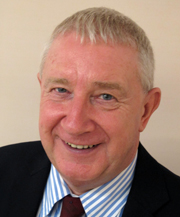From the CEO’s Desk - WONCA’s Global Reach

WONCA truly is a global organization, representing over 500,000 members in more than 140 countries and territories in all continents. We take our role, as the global voice of family medicine, very seriously, and we know from feedback that our members regard this global representation as one of the most important functions of WONCA. A lot has been happening over the past few months, and many more activities are ongoing, so I thought it important to report back to you all on what we have been doing, on your behalf, on the world stage.
Sustainable Development Goals
I’ve written on this in past months but, as a reminder to everyone, the Millennium Development Goals (MDGs), formulated by the UN in 2000, have now expired, to be replaced by the Sustainable Development Goals (SDGs), which will run until 2030.
The SDGs were launched with a fanfare at the end of September in a ceremony presided over by Angela Merkel, Bill Gates and Dr Margaret Chan, and I’m pleased to say that our President, Professor Michael Kidd, was invited as the representative of family medicine. Michael will report more fully on the event elsewhere, but we regard it as vital that family medicine continues to be represented at significant events such as this, to make sure that the critical role of family doctors and family medicine and primary health care is always at the forefront of planners’ minds.
The MDGs had eight goals, of which three had a health focus. The SDGs have 17 goals and 169 targets with only one goal focusing directly on health. SDG3 states “Ensure health lives, and promote well-being for all, at all ages”. Universal Health Coverage (UHC) – the ability to access health care regardless of ability to pay – is only one of the sub-goals and yet we regard this as central to achieving the SDGs. No-one should be kept in, or pushed into, poverty due to out-of- pocket expenditure, yet the World Bank reports that over 100 million people are pushed into poverty annually as a result of out-of-pocket expenditure on health care. That is why WONCA strongly supports the concept of health equity - that those who needed most resources received most help – and we work through our Special Interest Group on Health Equity to promote and support this.
Primary Health Care Performance Indicators
Of course of paramount importance will be how to monitor and evaluate progress in achieving the SDGs, and there have been many discussions in recent months about how to develop robust and relevant Primary Health Care Performance Indicators. Again, WONCA has been part of those discussions represented by our President, and he has been reminding everyone that WONCA has already developed relevant tools, in the form of a PHC coding system - the International Classification of Primary Care (ICPC) - developed and updated over the years by our WONCA International Classification Committee (WICC).
ICD-11 Development
WONCA is also now actively engaged with WHO in the development of the primary care elements of ICD-11. Discussions had been going on for some considerable time, but progress had stalled until fairly recently. However WHO has now acknowledged – prompted by a number of our Member Organizations writing directly to WHO to express concerns - that greater input is required from primary health care if ICD-11 is to be fit for purpose. Again it is our colleagues in WICC, with the WONCA ICPC coding, who are leading on this, most particularly Kees van Boven and Thomas Kuehlein. Kees recently represented us at a meeting of the Joint Linearization of Morbidity and Mortality Group, and further work with WHO is ongoing.
Other WHO representation
We also respond to many calls from WHO for inputs into meetings and consultation documents, and we are fortunate to have as our WONCA-WHO Liaison Dr Luisa Pettigrew, who does a fantastic job on our behalf. Recent responses have been submitted on the WHO Global Strategy for Human Resources for Health 2030 and the Global Coordination Mechanism for NCDs, and we will be represented later this month at meetings in Geneva on cardiovascular disease and on the global strategy and plan of action on ageing and health. Finally we are invited to be represented at most WHO Regional Council meetings. Professors Job Metsemakers and Anna Stavdal attended the WHO EURO Council meeting in Lithuania recently, whllst Dr Mohammed Tarawneh will attend the WHO EMRO meeting in Kuwait. We also hope to be represented at WHO AFRICA in Chad and WHO WPRO (Western Pacific) in Guam.
I hope you will agree that you are all being well represented by your leaders on the international stage, but we will continue to report form time to time on further inputs and activities. Meantime the WONCA Executive will meet face to face for two days in October, in Istanbul, and next month I’ll report back on some of the issues which were debated and discussed.
Dr Garth Manning
CEO